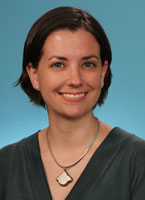Kelly R. Monk, PhD

Kelly R. Monk, PhD, assistant professor of developmental biology, is recognized for her breakthroughs in identifying the role of adhesion G protein-coupled receptors (aGPCRs) in the development, maintenance and regeneration of myelin, the protective sheath that surrounds many nerve cells.
Monk was the first to discover that the receptor gene Gpr126 is a novel regulator of axon myelination. Axons are nerve cell projections that carry electrical signals. This discovery, called the “holy grail” of myelination research by other investigators, subsequently led to the identification of the signaling pathways downstream of Gpr126 and its triggering mechanism. Monk’s team recently identified a second gene, Gpr56, which encodes a protein that also helps to regulate axon myelination. Monk’s research could have major implications for diseases associated with a lack of myelin, such as multiple sclerosis. Monk, who is internationally respected for her transformative discoveries and was selected in 2015 as one of only seven finalists for the first American Society for Cell Biology’s Emerging Leader Prize, currently has two National Institutes of Health (NIH) RO1 grants and other extramural funding to continue her research efforts.
An invited member of the NIH Cell and Molecular Biology of Glia study section, Monk is considered an engaging reviewer and presenter. She has successfully recruited and mentored outstanding graduate students and postdoctoral fellows and in 2015 was named an Outstanding Faculty Mentor by the Washington University Postdoc Society. Already an internationally respected leader in both the glial and aGPCR fields, Monk will co-chair the Cold Spring Harbor Meeting on Glia in Health and Disease in 2016.
Monk earned her doctorate degree from the University of Cincinnati. She joined the Washington University faculty in 2011.




